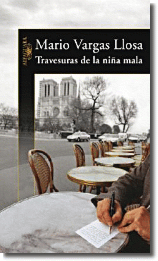Mario Vargas Llosa's fixation with Flaubert and Madame Bovary goes much deeper than this observation, according to new novel Travesuras de la niña mala (The Bad Girl’s Escapades).Mario Vargas Llosa on readers and reading:

"Madame Bovary doesn't read masterworks. She reads ... pulp fiction. That's what she reads: pulp fiction, love stories, very banal, very superficial. But these stories disturb her profoundly, because they give her the idea of a very different kind of life. A life of pleasure. A life of romantic deeds. A life in which women become heroines, martyrs. Romantic martyrs of love. And so what does she do with all this? She does exactly the same thing that Don Quixote does when he reads chivalry novels. He thinks life is like life in chivalry novels! ... In the case of Madame Bovary it's tragic. We admire Don Quixote because he doesn't accept the world as it is. Well, I think that is the function of literature: to make us desire a different kind of world and to create in us a kind of dissatisfaction with the world as it is. I think this is a very important function, because this gives you a kind of motivation to act for changing things, for transforming not only the society but moral values, cultural values."
In The Perpetual Orgy (1975), Vargas Llosa describes his own long love affair with Flaubert’s Emma Bovary. On first meeting her, he confesses, “I knew that from that moment on, till my dying day, she would be for me, as for Léon Dupuis in the first days of their affair, ‘the beloved of every novel, the heroine of every play, the vague she of every volume of verse’”. What makes her so compelling is her rebellion against the humdrum condition to which her destiny has condemned her, her determination to snatch at a more highly coloured, glamorous life. The bad girl [in the new novel] resembles Mme Bovary in this: in her case too we find a reminder that, as Flaubert’s lawyer Antoine-Marie-Jules Senard put it at the author’s prosecution over Madame Bovary, with masterful reductiveness, “dangers lie ahead for a girl who receives an education superior to that of her class”.Kerrigan again:
The other great virtue of Flaubert in Vargas Llosa’s eyes is that this most rigorous of a--Marshal Zeringuertists, this most meticulous of stylists, was so open in his engagement with vulgarity. Madame Bovary’s yearnings may seem absurd to us, yet her resolve to realize them remains inspiring, her failure tragic. “It pleases me”, writes Vargas Llosa, “that Madame Bovary can also be read as a collection of clichés–that it is peopled with stock characters.”... Vargas Llosa’s taste for such vulgarities has always been evident, as has been the transparent sincerity of his sensibility: this is no slumming aesthete or patronizing wit. He is being neither perverse nor condescending when he writes, in The Perpetual Orgy, “the melodramatic element moves me because melodrama is closer to the real than drama”. Overblown language and exaggerated gestures express a Bovaryesque rebellion against quotidian realities, though Vargas Llosa would resist any temptation to intellectualize them. Despising the sensibilities of kitsch and camp for the knowing detachment they presuppose, he insists on a straightforwardly emotional response to the most imbecilic extravagances of popular stories and song.





